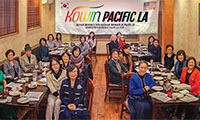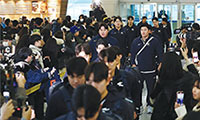▶ NICHOLAS D. KRISTOF
Fawzia was among the refugees straggling across the Syria-Jordan border here. She had just arrived on a dangerous weeklong journey from Ghouta, Syria, a Damascus suburb where nerve gas killed hundreds on Aug 21. But for Fawzia, chemical weapons are secondary. The real weapons of mass destruction in Syria are the AK-47s, rockets, missiles and bombs. An agreement brokered by the world’s powers that is limited to chemical weapons — while useful — seems a bit irrelevant to the atrocities that define the lives of most Syrians.
No one in Fawzia’s family was hurt in the chemical weapons attack, but then there was a ferocious conventional shelling of her neighborhood. Her family members scattered in terror, and Mustafa, her 8-year-old son, disappeared. No one knows what happened to him.
Fawzia decided to flee with two children to Jordan, in hopes of saving them, possibly sacrificing Mustafa. She is racked by guilt.
The United Nations refugee agency, which runs this Zaatari camp, is accustomed to tragedy. An aid worker gently told her how to register Mustafa’s name in case he turns up somewhere.
Talking to Syrians like Fawzia, it seems bizarre and narcissistic that in Washington there is talk of whether the Syrian crisis has been “resolved.” Maybe the politicians’ crisis there has been eased, but the humanitarian catastrophe here just gets worse.
Indeed, in the last couple of weeks, President Bashar al-Assad seems to have stepped up the pace of bombing, shelling and other conventional attacks on civilian areas.
Fawzia says she would like to see American missile strikes on her country, in hopes that an assault would degrade the Syrian army’s capacity for mass murder and shorten the war. That seems by far the most common view among refugees here, although it’s not universal. Some worry about civilian casualties or think a strike would be too little, too late.
Whatever one thinks of a military strike to destroy some of Assad’s murderous air force — I’m in favor but have very little company in America — we should find common ground in insisting that international negotiations address not only chemical stockpiles but also humanitarian access in Syria.
That would mean demanding that the Syrian government and rebels alike allow aid workers and food and medical assistance across their lines. It’s not impossible that both sides would agree under pressure, and that might ease some of the worst suffering within Syria.
Valerie Amos, the United Nations humanitarian chief, tells me that nearly seven million Syrians will need aid to survive. Humanitarian access could save some of those lives, and also reduce the hemorrhage of refugees.
The United Nations estimates that every 17 seconds another Syrian flees the country, placing almost unbearable strains on Lebanon and Jordan, in particular. Jordan has been remarkably welcoming to Syrian refugees, but public resentment has apparently led the government to tighten the arrival spigot recently, and many tens of thousands of displaced Syrians are now reportedly stuck on the Syrian side of the border.
One-third of Syrians are now displaced. On an American scale, that would be equivalent to 100 million Americans having fled their homes.
This refugee camp, Zaatari, is already one of the biggest cities in Jordan, and the refugees are tough to manage. A few months ago, they began dismantling a trailer that functioned as a police station. Within hours, there was nothing left; they had stolen an entire police station.
Many refugees told me that everyone in their neighborhoods would relocate to Jordan if it weren’t so dangerous to travel.
Fareeda al-Hassan, a woman from the city of Hama, had just crossed from Syria with a gaggle of children when I met her. She explained that government bombing had destroyed her home and she had seen pro-government militias behead children, so she paid a guide to smuggle them on a 10-day journey that bypassed government checkpoints. If soldiers think travelers are headed for Jordan, they sometimes execute them as presumptive traitors.
During the family’s journey, a machine-gun post opened fire on their convoy. The two vehicles in front of theirs, a bus and a private car, burst into flames and everyone in them was killed, Hassan said.
Guides ferrying Syrians to Jordan sometimes give small children sleeping pills so that they won’t cry from hunger and draw an attack from Syrian troops.
We may not be able to solve Syria’s problems. I’m not even certain that we can mitigate them. But we can try, and a starting point would be a big push for humanitarian access.
Maybe that would even allow aid workers to find Mustafa and reunite him with his guilt-ridden mother.
스마터리빙
more [ 건강]
[ 건강]이제 혈관 건강도 챙기자!
[현대해운]우리 눈에 보이지 않기 때문에 혈관 건강을 챙기는 것은 결코 쉽지 않은데요. 여러분은 혈관 건강을 유지하기 위해 어떤 노력을 하시나요?
 [ 건강]
[ 건강]내 몸이 건강해지는 과일궁합
 [ 라이프]
[ 라이프]벌레야 물럿거라! 천연 해충제 만들기
 [ 건강]
[ 건강]혈압 낮추는데 좋은 식품
[현대해운]혈관 건강은 주로 노화가 진행되면서 지켜야 할 문제라고 인식되어 왔습니다. 최근 생활 패턴과 식생활의 변화로 혈관의 노화 진행이 빨라지고
사람·사람들
more많이 본 기사
- 카페 총기난사 한인, 교도소서 피살
- [집중진단/ 복수국적법 절차 문제도 심각] 국적이탈 수속에 2년이나 걸리다니
- ‘옵티머스’ 전 대표 이혁진씨 LA서 사망
- 가주서 ‘스크래처 복권’ 잭팟 대박 잇따라
- OC서 ICE 항의 시위 남성 “사망할 뻔”
- 미 순이민, 반세기만에 첫 ‘마이너스’
- 특검, 윤 전 대통령에 ‘내란혐의’ … 1
- 새로 나온 이상한 식품 피라미드
- 미주 한인 이민 123주년 ‘축하’… LA 한인회관 현기식
- 주중 샌타애나 강풍 80도대 이례적 고온
- 박나래 전 매니저, 韓 떠났다..왜?
- 하워드 카운티·의회 미주 한인의 날 공동 선포
- 미동부한인스키협회, 제2차 스키 강습회
- 연방의회서 “한인 위상·한미동맹 제고” 한목소리
- 한국학교 방향성 재정립 모색
- 트럼프 “美시민에 사기친 귀화 이민자, 국적 불문 시민권 박탈”
- “뉴욕주민 생활비 부담 확 줄이겠다”
- 뉴저지주 ‘안티 ICE(이민자 단속 제한법안)’법안 시행 초읽기
- 알라딘 서점, 이달말 마당 매장 폐점
- 예수 닮은 교회 ‘예담교회’로 새출발
- 김종국, 쿠팡 사태 비껴갔다.. “앱 안 써서 홀로 안전”
- 직장생활 풍자 만화 ‘딜버트’ 작가 별세
- “독감 심각…마스크 착용 의무화”
- “자칫 쿵, 차량 손상”… LA시 팟홀 복구 박차
- ‘내란 우두머리’ 윤 전 대통령에 사형 구형
- 무료 대형 폐기물 수거 행사
- “미국 생산 자동차 사면 대출이자 세금 공제”
- 한동훈 “허위조작 제명, 또 다른 계엄선포…이번에도 막겠다”
- ‘트럼프 관세정책 역설’… 물가 보다 일자리 ‘직격탄’
- 미네소타주 ‘ICE 총격’ 반발 소송… “연방의 침공 중단돼야”
- 뉴저지 저소득 아파트 신청 일원화 된다
- 변우석→이유미 소속사 “명예훼손·성희롱·인신공격 법적 대응..선처 없다”
- 세리토스시 시니어 서비스
- 한동훈 전격 제명에 갈등 최고조…張-韓 ‘사생결단 충돌’ 우려
- 심형탁 子 하루, 1세대 꽃미남 김재중 만난다 “너무 예뻐”
- ‘낯설다’ 손흥민, 15년 만의 첫 ‘겨울 시즌’ 드디어 시작... ‘황제’ 메시와 맞대결도 ‘개봉박두’
- 세계적 암전문의 김의신 박사 세미나
- 미국 정부, 자국민에 “지금 당장 이란 떠나라”
- [데이빗 이그나티우스 칼럼] 그린란드에 대한 트럼프의 위험한 집착
- “트럼프, 이란 군사개입 선택 제한적…항공모함 없고 확전 부담”
- 2028 LA 올림픽 티켓 구입절차 공식 돌입
- 라스베가스 한인회 개최 내달 7일 설날 떡국 나눔
- 카드금리 제한 추진… ‘법적대응’ 불사
- 한국 운전면허증 교환 텍사스주 절차 간소화
- 트럼프, 이란과 대화 보류하며 反정부 시위대에 “기관 점령하라”
- 한국, 2살 어린 우즈벡에 0-2 충격패... U23 아시안컵 8강 ‘극적’ 진출
- ‘혼자는 못해’ 선우용여 “6.25 전쟁 겪었다..집 전소·폭탄 소리 들어”
- 미주 한인의 날 LA시의회 선포식
- 파라마운트, 워너브러더스에 결국 소송
- 씨티그룹, 1천명 감원 비용절감과 구조 조정
1/5지식톡

-
 한국 안경을 무료 배송으로 받아보실…
0
한국 안경을 무료 배송으로 받아보실…
0안녕하세요. 서울 안암동에 위치한 ‘보고싶다 안경원’입니다.저희는 다년간 한국 고객분들께 착용감 좋은 안경테와 한국안경브랜드,고압축 도수 렌즈를 합리적인 가격에 제공해온 안경 전문점입니다.이번에 해외 배송이 가능해…
-
 미 육군 사관학교 West Poin…
0
미 육군 사관학교 West Poin…
0https://youtu.be/SxD8cEhNV6Q연락처:wpkapca@gmail.comJohn Choi: 714-716-6414West Point 합격증을 받으셨나요?미 육군사관학교 West Point 학부모 모…
-
 ☝️해외에서도 가능한 한국어 선생님…
0
☝️해외에서도 가능한 한국어 선생님…
0이 영상 하나면 충분합니다!♥️상담신청문의♥️☝️ 문의 폭주로 '선착순 상담'만 진행합니다.☎️ : 02-6213-9094✨카카오톡ID : @GOODEDU77 (@골뱅이 꼭 붙여주셔야합니다…
-
 테슬라 자동차 시트커버 장착
0
테슬라 자동차 시트커버 장착
0테슬라 시트커버, 사놓고 아직 못 씌우셨죠?장착이 생각보다 쉽지 않습니다.20년 경력 전문가에게 맡기세요 — 깔끔하고 딱 맞게 장착해드립니다!장착비용:앞좌석: $40뒷좌석: $60앞·뒷좌석 …
-
 식당용 부탄가스
0
식당용 부탄가스
0식당용 부탄가스 홀세일 합니다 로스앤젤레스 다운타운 픽업 가능 안녕 하세요?강아지 & 고양이 모든 애완동물 / 반려동물 식품 & 모든 애완동물/반려동물 관련 제품들 전문적으로 홀세일/취급하는 회사 입니다 100% …
케이타운 1번가
오피니언
 정숙희 논설위원
정숙희 논설위원새로 나온 이상한 식품 피라미드
 데이빗 이그나티우스 워싱턴포스트 칼럼니스트
데이빗 이그나티우스 워싱턴포스트 칼럼니스트 [데이빗 이그나티우스 칼럼] 그린란드에 대한 트럼프의 위험한 집착
 김동찬 시민참여센터 대표
김동찬 시민참여센터 대표 [미국은 지금] 침팬지의 그루밍과 인간의 민주주의
 이명숙 수필가
이명숙 수필가 [수요 에세이] 문화강국
 신경립 / 서울경제 논설위원
신경립 / 서울경제 논설위원 [만화경] ‘구리 박사’ 은퇴설
 노세희 부국장대우·사회부장
노세희 부국장대우·사회부장 먼로 독트린과 돈로 독트린
 민경훈 논설위원
민경훈 논설위원트렌턴, 멜로스, 시실리, 레욱트라
 한형석 사회부 부장대우
한형석 사회부 부장대우 LA 시장 선거 구도와 선택지
 정유환 수필가
정유환 수필가 [화요칼럼] 어머님 전(前) 상서
1/3지사별 뉴스

“뉴욕주민 생활비 부담 확 줄이겠다”
▶ 자동차·주택 보험료, 공공요금 인하뉴욕주가 무상보육 확대와 임차인 보호, 공공요금 규제 강화 등을 올해 주요 역점 정책으로 정하고 뉴욕주민…
‘내란 우두머리’ 윤 전 대통령에 사형 구형

연방의회서 “한인 위상·한미동맹 제고” 한목소리
한인 이민자들이 미국에 도착한 123주년을 기념하고 한인들의 미국 사회에의 기여를 알리는 ‘제 21회 미주 한인의 날’ 행사가 13일 연방의회…
한국학교 방향성 재정립 모색

트럼프 “美시민에 사기친 귀화 이민자, 국적 불문 시민권 박탈”
도널드 트럼프 대통령은 13일 “소말리아든 어디 출신이든, 귀화 이민자 중 우리 시민들을 상대로 사기를 쳐 유죄 판결을 받으면 시민권을 박탈할…
살림으로 뿌리내리다- 테이크루트 안미정 대표의 요리 이야기 (9)

오늘 하루 이 창 열지 않음 닫기 



















































.png)


댓글 안에 당신의 성숙함도 담아 주세요.
'오늘의 한마디'는 기사에 대하여 자신의 생각을 말하고 남의 생각을 들으며 서로 다양한 의견을 나누는 공간입니다. 그러나 간혹 불건전한 내용을 올리시는 분들이 계셔서 건전한 인터넷문화 정착을 위해 아래와 같은 운영원칙을 적용합니다.
자체 모니터링을 통해 아래에 해당하는 내용이 포함된 댓글이 발견되면 예고없이 삭제 조치를 하겠습니다.
불건전한 댓글을 올리거나, 이름에 비속어 및 상대방의 불쾌감을 주는 단어를 사용, 유명인 또는 특정 일반인을 사칭하는 경우 이용에 대한 차단 제재를 받을 수 있습니다. 차단될 경우, 일주일간 댓글을 달수 없게 됩니다.
명예훼손, 개인정보 유출, 욕설 등 법률에 위반되는 댓글은 관계 법령에 의거 민형사상 처벌을 받을 수 있으니 이용에 주의를 부탁드립니다.
Close
x